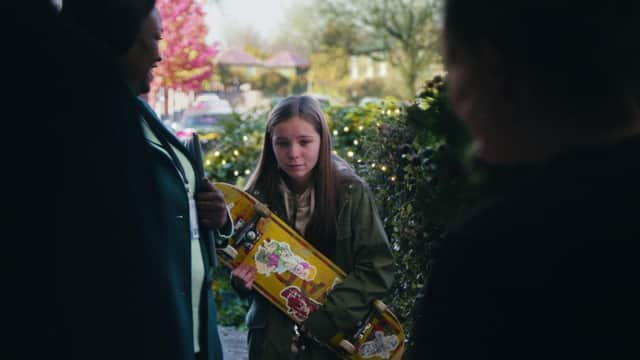John Lewis Christmas advert should make us think about all those who grow up in care – Karyn McCluskey


It’s not until the last few moments that it becomes clear that the man has been trying to connect to a young person his family is going to foster. In the final scene, the man and his partner answer the door to a teenage girl carrying a skateboard accompanied by a social worker. The message is about the care experience and the 108,000 children and young people who end up in care every year.
For the lachrymose amongst you, have the hankies ready, others might be more curmudgeonly but people should engage with the wider aspect which is about the apprenticeship schemes to help those with care experience gain skills and a career, and raising money for organisations who support them.
Advertisement
Hide AdAdvertisement
Hide AdYet it’s not just young people currently in care who need love, support and an understanding of the trauma that many will have experienced. Many need support into their 20s, 30s and beyond. They may have no family, no one to share the festive period, birthdays, joyous events or lean on when things get tough. Many find love, comfort, understanding and stability with new partners, family and friends, while others remain isolated, without the network and infrastructure that people need to thrive.
For the number of care-experienced young people and adults who end up in the justice system, their experience is compounded. Prisons can become all that they know, where people understand them. They meet others who have had similar experiences and there can be a comfort being with those who understand their journey and trauma.
I know many who have never had birthday cakes or felt part of a loving family. The fact that many sometimes feel safer in a prison than they do in temporary accommodation or in solitary flats, should make us all take stock.
Human beings are social creatures, we need a tribe for support, love, care, validation, communication and so much more. I know many people with care experience who look older, who are older, who have lived about ten lives’ worth of experiences, both bad and sometimes good. They have weathered huge upsets and change in their lives, and still need support, advice, love and friendship from those around them who know their journey.
The legacy of care may extend a lifetime and whilst individuals can get extra support until they are 26, it’s still often not long enough for many. I went back to my parents’ house in my late 20s and early 30s and I don’t know what I would have done without them. We all need someone to catch us.
Twitter (for all its faults) has been the most wonderful medium for people to speak about their care experience, their voices amplified and their opinions heard. Whatever you think about the skateboarding man or the advert, can you also think about the hundreds of thousands of adults who spent their lives in care and who might also need a bit of your support and understanding? One good person who is there for someone might make all the difference.
Karyn McCluskey is chief executive of Community Justice Scotland